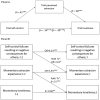Low Self-Control: A Hidden Cause of Loneliness?
- PMID: 33855889
- PMCID: PMC8855382
- DOI: 10.1177/01461672211007228
Low Self-Control: A Hidden Cause of Loneliness?
Abstract
Loneliness has been associated with multiple negative outcomes. But what contributes to loneliness in the first place? Drawing from the literature on the importance of self-regulatory ability for successful social functioning, the present research explored the role of low self-control as a factor leading to loneliness. A set of four studies (and three additional studies in Supplementary Online Materials) using cross-sectional, experimental, daily diary, and experience sampling methods showed that lower self-control is associated with higher loneliness at both trait and state levels. Why does low self-control contribute to loneliness? Self-control failures that have negative implications for others lead to higher risks for being ostracized by others, which predicts increased feelings of loneliness over time. These results suggest that low self-control, which is often associated with negative intrapersonal outcomes, can have important interpersonal consequences by evoking ostracism, and consequently, loneliness.
Keywords: daily diary; experience sampling; loneliness; ostracism; self-control; social exclusion.
Conflict of interest statement
Figures



Similar articles
-
Can't Buy Me Love (or Friendship): Social Consequences of Financially Contingent Self-Worth.Pers Soc Psychol Bull. 2020 Dec;46(12):1665-1681. doi: 10.1177/0146167220910872. Epub 2020 Mar 19. Pers Soc Psychol Bull. 2020. PMID: 32188335
-
Is emotional functioning related to academic achievement among university students? Results from a cross-sectional Iranian sample.Braz J Psychiatry. 2018 Jul-Sep;40(3):290-295. doi: 10.1590/1516-4446-2017-2434. Epub 2018 Mar 12. Braz J Psychiatry. 2018. PMID: 29538489 Free PMC article.
-
Seeking Solitude After Being Ostracized: A Replication and Beyond.Pers Soc Psychol Bull. 2021 Mar;47(3):426-440. doi: 10.1177/0146167220928238. Epub 2020 Jun 9. Pers Soc Psychol Bull. 2021. PMID: 32515281 Free PMC article.
-
Extending understanding of grandchild care on feelings of loneliness and isolation in later life : A literature review.Z Gerontol Geriatr. 2021 Aug;54(5):513-516. doi: 10.1007/s00391-020-01776-5. Epub 2020 Aug 27. Z Gerontol Geriatr. 2021. PMID: 32856121 Free PMC article. Review.
-
Loneliness: a concept analysis.Nurs Forum. 2008 Oct-Dec;43(4):207-13. doi: 10.1111/j.1744-6198.2008.00114.x. Nurs Forum. 2008. PMID: 19076464 Review.
Cited by
-
Association of loneliness and grey matter volume in the dorsolateral prefrontal cortex: the mediating role of interpersonal self-support traits.Brain Imaging Behav. 2023 Oct;17(5):481-493. doi: 10.1007/s11682-023-00776-4. Epub 2023 Jun 6. Brain Imaging Behav. 2023. PMID: 37277604
-
Profiles of Loneliness and Ostracism During Adolescence: Consequences, Antecedents, and Protective Factors.Child Psychiatry Hum Dev. 2024 Feb 9. doi: 10.1007/s10578-024-01664-8. Online ahead of print. Child Psychiatry Hum Dev. 2024. PMID: 38337110
-
The Relationship Between Work-to-Family Conflict and Conspicuous Consumption: An Identity Theory Perspective.Psychol Res Behav Manag. 2023 Jan 6;16:39-56. doi: 10.2147/PRBM.S388190. eCollection 2023. Psychol Res Behav Manag. 2023. PMID: 36636292 Free PMC article.
-
More grateful, less addicted! Understanding how gratitude affects online gaming addiction among Chinese college students: a three-wave multiple mediation model.BMC Psychol. 2023 Aug 23;11(1):241. doi: 10.1186/s40359-023-01271-7. BMC Psychol. 2023. PMID: 37612743 Free PMC article.
-
The Effect of Loneliness on Non-Suicidal Self-Injury Behavior in Chinese Junior High School Adolescents: A Moderated Mediation Model.Psychol Res Behav Manag. 2023 May 16;16:1831-1843. doi: 10.2147/PRBM.S410535. eCollection 2023. Psychol Res Behav Manag. 2023. PMID: 37215700 Free PMC article.
References
-
- Baumeister R. F., DeWall C. N., Ciarocco N. J., Twenge J. M. (2005). Social exclusion impairs self-regulation. Journal of Personality and Social Psychology, 88(4), 589–604. - PubMed
-
- Baumeister R. F., Exline J. J. (1999). Virtue, personality, and social relations: Self-control as the moral muscle. Journal of Personality, 67(6), 1165–1194. - PubMed
-
- Baumeister R. F., Vohs K. (2007). Self-regulation, ego depletion, and motivation. Social and Personality Psychology Compass, 1, 115–128.
-
- BBC. (2018). 16-24 year olds are the loneliest age group according to new BBC Radio 4 survey. https://www.bbc.co.uk/mediacentre/latestnews/2018/loneliest-age-group-ra...
-
- Betts L. R., Rotenberg K. J. (2007). Trustworthiness, friendships and self-control: Factors that contribute to young children’s school adjustment. Infant and Child Development, 16(5), 491–508.
MeSH terms
LinkOut - more resources
Full Text Sources
Other Literature Sources

